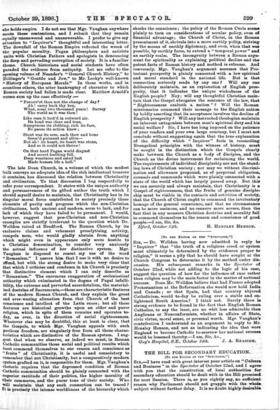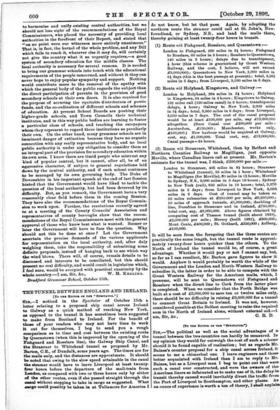THE BILL FOR SECONDARY EDUCATION.
[TO THE EDITOR OF THE "SPECTATOR."'
have read with great interest your article on "Culture and Business " in the Spectator of October 22nd, and I agree with you that the constitution of local authorities for secondary education should be dealt with in the Bill promised for next Session. There is, as you rightly say, no sufficient reason why Parliament should not grapple with the who subject without further delay. It is no doubt highly desirable
to harmonise and unify existing central authorities, but we should not lose sight of the recommendations of the Royal Commissioners, who placed the necessity of providing local authorities in the forefront of their Report, and stated that
• `on no point were our witnesses more entirely unanimous."
That is, in fact, the kernel of the whole problem, and any Bill which fails to reach it, whatever else it may do, will certainly not give the country what it so urgently requires,—a good system of secondary education for the middle classes. The local authority is necessary for several reasons. It is needed to bring our grammar schools into touch with the educational requirements of the people concerned, and without it they can never hope to enjoy popular sympathy and support. Nothing would contribute more to the removal of the apathy with which the general body of the public regards the subject than the direct participation of parents in the provision of good secondary schools at their own doors. It is also required for the purpose of securing the equitable distribution of public funds, and the co-ordination of different schools and schemes of education. At present School Boards are pushing their higher-grade schools, and Town Councils their technical institutes, and in this way public bodies are learning to foster a particular class of schools, and teaching the ratepayers whom they represent to regard these institutions as peculiarly their own. On the other hand, many grammar schools are in imminent danger of extinction because they have no organic connection with any really representative body, and no local public authority is under any obligation to consider them as an integral part of the provision for secondary education within its own area. I know there are timid people who mistrust any kind of popular control, but it cannot, after all, be of an aggressive character, if subject to general regulations laid down by the central authority, and if each school continues to be managed by its own governing body. The Duke of Devonshire in his important speech at the end of last Session hinted that the Government would have liked to tackle the question of the local authority, but had been deterred by its difficulty. But, as you remark, the Government have a very reasonably clear field before them in the coming Session. They have also the recommendations of the Royal Commis- sion to work upon. Further, the resolutions recently agreed to at a meeting of the County Councils' Association and representatives of county boroughs show that the recom- mendations of the Royal Commissioners meet with the general approval of those who know best what is wanted. Sooner or later the Government will have to face the question. Wby should not this be done at once ? Let the Government ascertain the precise demands of the various applicants for representation on the local authority, and, after duly weighing them, take the responsibility of submitting some definite proposals, instead of banging back to see which way the wind blows. There will, of course, remain details to be discussed and interests to be conciliated, but this should present no real difficulty, and would result in legislation which, I feel sure, would be accepted with practical unanimity by the







































 Previous page
Previous page